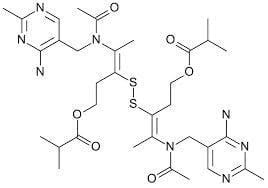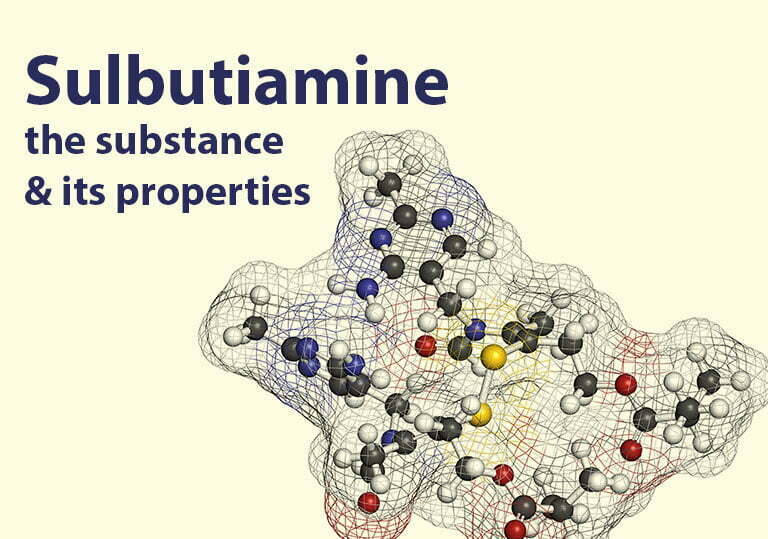Sulbutiamine is a synthetic derivative of thiamine (vitamin B1) developed in Japan in the mid-1960s.
Sulbutiamine was created as a result of combining two thiamine molecules via a disulphide bond. In this process, the molecule develops lipotropic properties, which significantly increases its bioavailability. Among other analogs, sulbutiamine stands out for its ability to deliver thiamine to less accessible tissues, as well as to cross the blood-brain barrier.

Sulbutiamine
Sulbutiamine, also known as isobutyryl thiamine disulfide, is a synthetic form of vitamin B1. This vitamin is responsible for improving learning skills, memory, and concentration.
Thiamine is a very important substance for the overall health of the body. It is a cofactor in many enzymatic reactions which control metabolic processes. It stimulates the brain and has a positive effect on the psycho-emotional condition. Thiamine is found in large quantities in body organs characterized by a high rate of metabolism, such as the heart or liver.
Sulbutiamine and memory
Since its market introduction, sulbutiamine has become most known for its nootropic properties. Studies have shown that thiamine deficiency, and the resulting cognitive function decline, are the underlying factors in some neurodegenerative diseases (Alzheimer’s disease, Parkinson’s disease). Long-term supplementation with sulbutiamine increases choline uptake, which is used by the hippocampus, the part of the brain responsible for long-term memory creation. Thiamine is also an important cofactor in the synthesis of acetylcholine, a neurotransmitter needed in learning.
Studies have proven that supplementation with the right dose of sulbutiamine has a positive effect on attention focus, memory creation and information retrieval.
Sulbutiamine as a remedy for fatigue
Mild symptoms of thiamine deficiency include a sense of fatigue, irritability, lower mood and concentration disturbances. Therefore, sulbutiamine is used to treat asthenia, i.e. symptoms of physical or mental fatigue. In these ailments, sulbutiamine acts mainly as a transmission modulator in the central glutamatergic and dopaminergic systems. As a result, the number of dopamine (D1) receptor bonds increases and impacts the circulation of neurotransmitters, which improves reaction speed, alertness, and also may enhance motivation, making sulbutiamine a popular supplement among athletes.
Sulbutiamine: neuroprotective properties
The brain uses about 20% of all oxygen needed by humans to survive, and is particularly exposed to free radicals. Almost 5% of oxygen used in metabolic reactions is turned into its reactive forms. Excessive production of free radicals, lower activity of antioxidant enzymes or decreased concentrations of reducing factors may lead to oxidative stress in the brain.
Sulbutiamine has neuroprotective properties thanks to thiols it contains. Concentration of thiols has been shown to be an important regulator of cell redox processes, because they supply large quantities of antioxidants. Interestingly, it has been demonstrated that a few thiol-containing compounds, including sulbutiamine, increase the level of glutathione, which is important in the prevention of oxidative stress in brain cells.
Sulbutiamine – anticancer properties
Thiamine has also been named as a potential inhibitor of neoplasm proliferation. Much evidence indicates that sulbutiamine, thanks to its high bioavailability, may have particularly strong anticancer potential.
Literature:
- Bernardo Starling-Soares, Pedro Carrera-Bastos, Lucien Bettendorff, “Role of the Synthetic B1 Vitamin Sulbutiamine on Health”Journal of Nutrition and Metabolism, 2020
- Irena Bubko, Beata M. Gruber, Elżbieta L. Anuszewska, Rola tiaminy w chorobach
- Fabrice Trovero, MarcoGobbi, JeanneWeil-Fuggaza, “Evidence for a modulatory effect of sulbutiamine on glutamatergic and dopaminergic cortical transmissions in the rat brain”, Neuroscience Letters
- Dmitriev, Gamidov, Permiakova, “Clinical efficacy of the drug enerion in the treatment of patients with psychogenic (functional) erectile dysfunction”, Urologiia, 2005


